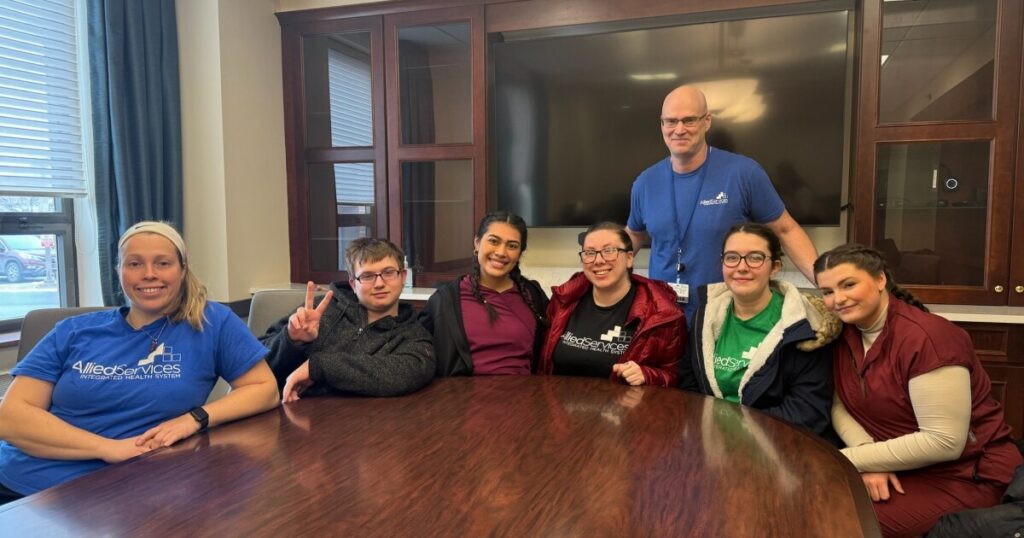As the healthcare sector grapples with an impending shortage of certified nursing assistants (CNAs), innovative solutions are emerging to address this challenge. One such initiative is spearheaded by Allied Services, which offers new hires the opportunity to undergo CNA training with financial support, aiming to bolster the workforce.
Following her high school graduation, Sofia Gutierrez aspired to pursue higher education but lacked the necessary funds. Her situation changed when a family member introduced her to Allied Services, which not only facilitated her training as a CNA but also promised to finance her continued nursing education.
In response to a national decline in the nurse assistant workforce, Allied Services compensates new hires like Gutierrez during their CNA training. This approach comes at a crucial time, with a report by Mercer forecasting a shortage of 73,000 nursing assistants by 2028 and a broader deficit of 100,000 healthcare workers.
“There’s a huge need in the community in healthcare,” stated Roy Harrity, an instructor in the CNA program. He emphasized the growing demand as the population ages, particularly with the baby boomer generation.
Allied Services conducts CNA classes at its skilled nursing facilities in Wilkes-Barre and Scranton. Upon hiring, the company also provides full tuition coverage at Lackawanna College for selected degree programs, available to both full-time and part-time employees.
The financial aspect of CNA training often poses a hurdle, with the U.S. Bureau of Labor Statistics reporting a median annual CNA salary of $38,130, while training costs in Pennsylvania range from $800 to $1,200.
Training Costs Covered
Allied Services alleviates this financial burden by covering training and exam fees while paying trainees $17 an hour. Upon training completion, the wage increases to $18 an hour, lasting until the trainees pass the state board exam. Successful CNAs start with a base pay of $22 an hour, with additional shift differentials.
The program is drawing a new wave of workers. Kayla Gowka, a recent trainee, noted, “If I didn’t find out about the class, I would have never went and tried to get my CNA, just because I don’t have the money to pay for it.”
Instructor Roy Harrity, who has led the classes for over two years, will soon welcome his 13th cohort. His classes average ten participants, with a commendable 90% first-time exam pass rate.
Submitted by Allied Services
The latest cohort sat for the exam on January 16, and all six candidates passed the following day. Allied covers up to three attempts per trainee.
‘I Walked the Mile in Their Shoes’
Instructor Harrity, who began his career as a CNA, expressed empathy for his students, saying, “I was a CNA before I was a nurse, so I walked the mile in their shoes. I know what they’re going through. I could relate.”
Blake Murphy, a recent high school graduate, was swayed by the financial incentives to obtain his CNA certification immediately after graduation. “I think it’s really good they’re paying for it because I’m fresh out of high school, so I don’t have a lot of money to my name,” Murphy remarked.
Kelly Graham, who holds a degree in sports medicine, opted for a career shift back to healthcare after working in the service industry. She expressed gratitude for Allied’s support, saying, “The fact that they paid was a huge bonus, and the fact that they will continue to pay for any schooling that I need after, it makes you want to stick with the company.”
Referrals Are Key
Referrals play a significant role in attracting new trainees. Bobbilynn Komrowski, who completed her training in early 2024, transitioned from an airline job to working as a CNA at Allied’s Center City location. She highly recommends the program to prospective CNAs.

Lydia McFarlane
/
WVIA News
“I came in never working in healthcare, so I had absolutely no clue what I was signing up for,” Komrowski said. “Now I love it. I feel like I’ve been doing it for 20 years. So it’s a great training program.”
In collaboration with United Neighborhood Centers of NEPA (UNC), Allied extends support to new hires, helping them navigate personal challenges such as childcare, transportation, and housing, ensuring they succeed both in class and at home.
“We want people to be successful in the class,” said Judy Oprisko, Allied’s chief human resources officer. She highlighted the company’s commitment to helping employees balance personal and professional demands to achieve their goals.
This comprehensive support system, which includes paid training and testing fees, is designed to facilitate success for new hires in the healthcare field.





